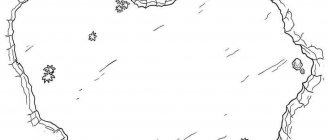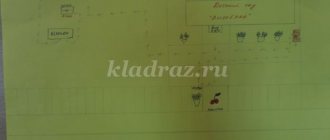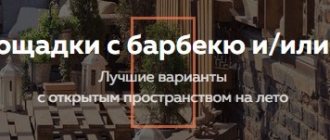I will not once again complain about the situation in the country and talk for a long time about how badly the online spring went with distance learning and the last bell, and how thousands of children were left without rest at summer camp in 2021. The Internet is full of such suffering, and you and I need to figure out what to do in this situation.
I won’t try to please everyone, since there are opposing opinions on this idea. Some consider distance learning to be nonsense, others see new opportunities for the development of a child who has stayed in a city apartment all summer. Registration in such camps is purely voluntary, so I will focus on those who are ready for the experiment.
I sketched out ideas, but immediately appealed to the collective wisdom. It happens that you find an interesting idea from someone, and you immediately have a dozen new ones. If suddenly my article became a source of inspiration, please write in the comments how else you can entertain children in an online camp, what events you think work well in this format and how best to create a program for each session.
A series of lectures by anthropologist Stanislav Drobyshevsky “The History of Man: From Cell to Civilization”
Svklimkin / commons.wikimedia.org
When: until June 26 Age: from 14 years
Stanislav Drobyshevsky has been teaching his course on human history for children for a whole year. Summer lectures are already finals, but don't worry that you missed everything. Each lecture by Stanislav Drobyshevsky is a fascinating immersion into the past. In some unique way, he manages to talk about complex things in the simplest words.
More details
Courses, lectures, performances, audiobooks for children
Khan Academy
Khan Academy is a non-profit organization that provides free education to children from all over the world. The site contains practical exercises, educational videos and courses in mathematics, chemistry, biology, physics, programming, world history, as well as art history, economics and many other subjects. All this allows you to study new material at your own pace, both in class and at home.
Arzamas
The Arzamas children's room features cartoons, books, old Melodies records for kids, podcasts, video lectures and games. These are not hackneyed cartoons from YouTube, but, for example, selections of plasticine and puppet animation, festival-winning cartoons and fairy tales from around the world.
Pocket Scientist
A project by the publishing house “Pink Giraffe” with audio recordings about everything in the world. The entries are currently not being updated, but 95 old issues are current and will last for a long time.
Galileo
A channel of programs about experiments, experiences, life hacks, inventions and educational videos about how objects and phenomena around us are structured and created.
Guide to theatrical online broadcasts
Russian and foreign theaters are forced to close their doors to visitors in the fight against coronavirus, but the number of online broadcasts of performances on the network is growing. Follow the schedule of your favorite theaters and go to performances right from home.
Video tour of the Baikonur launch
A video tour of the legendary, very first space launch complex on the planet, from where the first artificial Earth satellite and the first cosmonaut Yuri Gagarin were launched into orbit. The video, shot in 360-degree format, talks about the systems of the launch complex and the stages of preparing the Soyuz rocket for launch.
Tales out loud
Channel of dad who reads bedtime stories to children. You can turn on your phone before going to bed and place it face down.
MIPT Summer School
kmipt.ru
When: from June 21 to August 13 Age: from 13 to 18 years
One of the main technical universities in the country is organizing an online school for all children who managed to finish 7th grade. Practical classes in two areas: mathematics plus physics or programming plus project activities. The offer is not free, but it pays off with experienced teachers and an intensive program.
More details
College du Leman CDL Summer Camp
Duration of the program:
2 weeks (it is possible to extend the stay in the camp from 3 to 6 weeks)
Age programs:
8-18 years
Program dates:
July 07-20, 2021 July 21 - August 03, 2021 August 04-17, 2019
Program cost:
5700 Swiss francs ($5740 or €5000)
Location:
Switzerland, Versoix, Route de Sauverny 74, Collège du Léman.
Let me emphasize right away that Versoix is a suburb of Geneva, so transport links are fine.
Du Leman College offers as many as 3 separate children's camp programs. We are interested in the Genius program. It is noteworthy that the student can choose to create his own program for himself. The child is offered 7 educational blocks, 2 of which he can choose to suit his taste.
These are the programs:
- Programming
- Forensic laboratory
- Startup creation
- English language
- French
- Leader School
- Robotics
All programs take into account the age of students and are conducted in a playful way.
That is, in the forensic laboratory, students will investigate a “crime”, simultaneously studying and using various instruments and devices. According to the organizers, along with “programming,” the most common choice is “forensic laboratory” or “robotics.”
There is also a large selection of evening entertainment for students, including bowling, laser tag, discos, board and team games and much more.
The price includes accommodation, 3 meals a day, entertainment, educational materials and consumables, weekend excursions, transfer from Geneva airport and back.
In general, a very worthy program that children will definitely enjoy. The only thing that is desirable is knowledge of French at least at a basic level - many students from France participate in the programs.
Children's room "Arzamas"
arzamas.academy
When: all summer Age: any
Arzamas is open all year round, but in the summer it’s especially great to immerse yourself in it. You can explore the site with your child, or you can leave him alone - there are even too many materials. There is everything: from audio fairy tales and riddles to courses on the history of classical music and the creativity of the Oberiuts. It is not necessary to go to the website; Arzamas has an application for children and parents called Gusgus.
More details
Educational platforms and applications for children
YaClass
The school simulator for all subjects YaKlass offers 1.6 trillion. school curriculum assignments and 1,500 video lessons. The portal is suitable and recommended by the Ministry of Education for distance learning during the holidays.
Russian electronic school
Interactive lessons covering the entire school course from grades 1 to 11 from the best teachers in the country, created to ensure that every child has the opportunity to receive a free, high-quality general education.
Yandex.Tutorial
Assignments in mathematics and Russian with automatic checking. Over 45,000 unique activities for grades 1–5. The tasks were developed taking into account the Federal State Educational Standard. Available from any device. The interface is minimalistic, without advertising.
School assistant
A service for consolidating knowledge acquired at school or catching up on missed material. The project was created for additional classes in school subjects: Russian language, mathematics, geometry, algebra (grades 5-8).
Interlesson
Home school InterUrok - complete secondary education from grades 1 to 11. These are videos, notes, tests and simulators for all main subjects. It is possible to officially enroll at any time of the year. Most items are available for free. Russian language, mathematics (including algebra and geometry), physics and chemistry - by subscription. There is a trial period for a week.
Foxford
Online school for students, teachers and parents from grades 1 to 11. Content in Foxford is paid; you can put together an individual package of courses to suit your child’s difficulties and interests. There are profitable promotions and sales. For example, Foxford has now given free access to all courses in the school curriculum during quarantine in schools (starting from 5th grade).
Math us
A resource for preparing for olympiads in mathematics and physics, as well as detailed pdf files with theory and assignments for the school curriculum.
01Mathematics
50,000+ unique activities and 150+ hours of math instructional videos. Each problem has a solution, and many of them are accompanied by a video with explanations, which, when viewed, can help you sort out any difficulties. The complexity of the assignments increases very smoothly; educational topics are patiently explained by teachers and mathematicians with extensive experience. At this time, you can go about your business and at the same time be sure that your child will figure everything out without your help.
Educational
Educational provides access to its distance programs: geometry, combinatorics, linguistics, physics and computer science. Anyone can learn from them. Registration is open until May 15. Each online course consists of several parts with video lectures, notes, mandatory and additional exercises. Following the results, participants will receive an electronic certificate of successful completion. This is not a school program, but additional training to it.
Egesha
Resource for preparing for the Unified State Exam and the Unified State Exam. Lessons, including videos, practical materials, cheat sheets and tables on the main subjects.
I WILL SOLVE OGE
Distance learning system for exam preparation. The task databases are specially developed for the portal, and are also compiled on the basis of open banks and official collections, demo versions and examination tasks, diagnostic and training works on the OGE.
4VPR
All-Russian tests from grades 5 to 11. The site publishes work schedules, official demo versions, training options and samples of CDs in the main subjects.
DSHI-online
dshi-online.ru
When: all summer Age: from 7 to 17 years
A window for children into the world of art. Free courses where you can draw cartoons, create installations and try your hand at painting portraits. There are many directions, together with your child, choose what your heart lies in. Experienced teachers are always in touch - they advise, correct, answer questions.
More details
Bucksmore Coding Program
Program duration:
2 weeks
Age programs:
10-13 years and 13-16 years
Program dates:
July 02-16, 2021 July 09-23, 2021 July 16-30, 2021 July 23 - August 6, 2019
Program cost:
2600€
Location:
United Kingdom , London, 259 Greenwich High Road, Bucksmore Education.
The main “trick” of the camp, according to the founders, is learning two languages of the future at once: English and Python.
Students receive a Raspberry Pi microcomputer on which they will learn the basics of Python. In general, the course is very interestingly balanced in terms of educational and entertainment programs.
- 15 hours per week studying and practicing English
- 7.5 hours per week learning the basics of programming
- 2 full day excursions and 1 half day excursion per week
- Evening entertainment activities with participants of the Bucksmore Summer and Bucksmore Adventure programs.
The result is a camp with a lot of entertainment and extensive English practice, in which the child will also be taught the basics of programming.
There is a maximum of 11 children in a study group. The cost of the program includes accommodation, meals, educational materials, excursions, transfer from Heathrow or Gatwick airport and back, as well as gift baskets.
The founders claim that the children will only need money for souvenirs - everything else has already been provided for.
Skysmart School Summer Program
skysmart.ru
When: all summer Age: from 4 to 18 years
No grades, no homework, no cramming, but a lot of great teachers and creativity. Summer courses will include things that do not always fit into the school framework: games, experiments, creative experiments and discussions.
The child chooses a goal—to develop a new skill, to make good use of his free time, or to prepare for adult life—and then selects suitable courses for himself. This way, each student gets an individual schedule and program. An ideal summer extension.
More details
Activities for the online camp (block options for creating a program):
I studied the duration of live broadcasts recommended by various organizers:
— Every hour for 20-30 minutes (4-6 blocks daily); — 3 blocks of 2 hours (without constant connection to the screen) with breaks of 30 minutes, evening connection with summing up for 30 minutes; — 3-4 hours in a row, but you don’t need to look at the screen all the time (it’s enough to listen and do your creative work, periodically talking with other children and the counselor); — 2 classes of 30 minutes in the morning, 2 classes of 30 minutes in the evening.
Usually classes are held in blocks. For some, each block is conducted by one counselor. Most often, of course, there are different presenters for each type of activity.
Naturally, there are no mandatory or recommended classes. We are doing all this for the first time in history, so the first couple of weeks will definitely be experimental. What of this you can and want to do, what children can and want to do, no one knows.
And everyone's experience is different. There are some counselors whose energy cannot be dampened by any online obstacles. They perfectly control a huge audience, communicating through the monitor screen. Beginners who have never worked in a regular camp will face even greater difficulties in a remote format.
∇ Educational block
Many parents want their child to do something serious, but in a fun way, in the summer. In principle, there are entertaining lessons on all subjects, you can use fragments of educational films or demonstrate interesting experiments recorded by restless bloggers and explain them from a scientific point of view.
- Special training programs designed by professional teachers will help you spend your time profitably.
Online camp Pixel - programming training for children from 8 years old.
Held on weekdays in the first half, 4 programs to choose from, 2 classes per day. Classes are held with a teacher in a mini-group of 6 children. Your child will be interested if he is interested in gadgets, loves computer games or is already learning to program.Read more about the programs here.
In a summer camp, English is most often actively repeated, but you can think of fun lessons in Russian, mathematics and the world around you. There are collections of “Entertaining Chemistry”, “Entertaining Physics”, and “Encyclopedia of Interesting Facts”.
Children in grades 7-9 are offered preparation for the Unified State Exam, Unified State Exam, and Olympiads in various subjects.
∇ Important skills
Many parents themselves are passionate about self-development, personal growth techniques, and developing soft skills. They will definitely like your proposal to conduct mini-trainings for teenagers: “How to communicate effectively”, “Leadership”, “How to overcome the fear of public speaking”, “Conflict management”, etc.
You can add classes on financial literacy, career guidance, show exercises for training your voice and intonation, and teach simple techniques for quick memorization.
There are interesting techniques for time management and effective planning, tips for combating laziness and procrastination.
All this is possible if a psychologist works in your camp.
∇ Sports block
A little theory and a lot of practice. In order for children to consciously engage in sports, it is important to explain in simple language the purpose of each movement. Everyone knows that they need to do exercises, but few people understand why certain exercises are done. Why not find out with an online coach?
Cardio training (Zumba, aerobics) can be alternated with stretching, Pilates or yoga, and strength training with your own weight.
You can give tasks according to a checklist for the week: run 100 meters 5 times, jump from a place 10 times, hang on a horizontal bar with a stopwatch, etc.
∇ “Household” block
We teach important skills that will be useful in everyday life. Let there be a collection of useful tips, maybe some of this will interest the children, turn off the computer and do something useful. Here are a few examples, the list could be endless:
- learn how to tie different strong knots (you will need 2 ropes)
- plant seeds of flowers or vegetables (for the first time in my life, my city child grows cucumbers from seeds in flower pots on the 19th floor) or a violet from a leaf (there will always be neighbors with such plants, they will give a leaf)
- wipe the dust correctly (after looking at pictures of dust under a microscope, I really want to do this more often)
- cook simple meals (idea for children over 10 years old)
- how to keep your room tidy (there are many useful life hacks in pictures)
- how to disinfect a smartphone, glasses, and other items after visiting public places
- how to fold T-shirts, pullovers, jeans so that they take up little space in the closet
- how to wrap a gift in paper
- how to properly sort garbage to save the planet
- how to clean darkened spoons (I know from experience, it’s a cool activity for a boy)
- how to brew delicious tea
- how to use the Yandex map (find your home, get directions, switch to satellite view), etc.
∇ Artistic creativity
This is the most common type of online leisure. For example, step-by-step right-brain drawing lessons have flooded the Internet. It is very easy to repeat, and everyone gets decent results.
I’ll list again what you can do here.
- drawing and painting (pencils, crayons, watercolor, gouache) or digital sketching
- applique
- mosaic from different materials
- art collage of pictures from glossy magazines (you can even have a fashionable wish card)
- comics (for starters, we can all have one scenario with the same number of pictures, our children have already made an evil character out of the coronavirus, who was defeated by a superhero from 4 “A”)
- come up with your own monogram
- lettering (there are simple lessons for beginners)
- doodling (very cool weirdos that fill the entire sheet)
- zentangle (there are a lot of short videos of “motifs” with gel pens on the Internet; they almost always work out the first time)
- clothing models (there are many men among the fashion designers, so boys can also join. As a last resort, we give them the task of coming up with a theatrical costume)
- unusual alphabet
etc.
Children show their finished works on camera during the evening or morning connection, send photos or post them on social network pages.
∇ Photo projects
Another type of creativity available online. It’s more interesting to shoot on assignment, so come up with topics and discuss techniques.
For example:
- Flat lay. I couldn’t find a normal Russian name, sorry. This is an overhead shot of objects beautifully laid out on a table or floor. Bloggers often use this (a cup of tea, a book, pens, sweets, flowers).
- Sunset.
- Curious animals.
- Portrait of my mother (grandmother, sister).
- Butterflies (caterpillars, lizards, frogs and grasshoppers are also suitable).
- Strange clouds.
- Scenes from the life of toys.
- Tops and roots (photographing beautiful fruits or vegetables of unusual shape)
- “Pictures”, letters and words from things, toys or vegetables
- Collage of photos
- "Secrets of Selfie"
- How to Improve Your Photography Using Smartphone Apps
- Photocross (a series of frames according to the assignment: a blue car, a man in red clothes, a small dog, a huge dog, a stray animal, a flower, twins, a baby in a stroller, etc.)
∇ Handicraft master classes
There are difficulties here. Naturally, they are associated with the need to use consumables that children may not have on hand.
You have three options:
1. The child probably has all the tools and materials at home (paper, cardboard, plasticine, glue stick, scissors, old magazines)
2. You provide a list a week before the master class, so that parents have time to buy everything they need in a regular supermarket (Titan glue, foil, toothpicks, napkins, colored, velvet and crepe paper, photo frames, disposable tableware made of cardboard and plastic, rope , cling film, hole punch, stapler, markers for glass and plastic, wooden skewers, acrylic paints). Naturally, you first decide what exactly you will do with the children, then make a list.
3. You collect everything you need for the master classes yourself, and the courier delivers it in a box to the doorstep of the apartment, if all your students live in the same city. This applies to expensive master classes for which parents themselves will not be able to get materials (contours for dot painting, wooden blanks, fasteners for creating magnets, felt, canvases, fillers for toys, T-shirts for painting with a set of paints, clay and wooden figurines for decoration , rice napkins for decoupage, stencils, kits for creating kaleidoscopes, gingerbread and icing, beads, seed beads, glue gun, etc.).
Here is an approximate list of master classes, for which everything can be bought in regular stores:
- origami
- paper crafts using scissors and glue
- bouquet of sweets
- figures made of foil and plasticine
- painting of disposable tableware (children make beautiful sets in different styles)
- magnets, toys, felt bookmarks
- capitoshka
- paintings on stones
- Venetian masks
- rope dishes
- Stuffed Toys
Master classes for which you need to collect boxes of materials:
- decoupage (boxes, candles, bottles)
- dot painting (notepads, document covers, bottles, plates, mugs)
- painting clay or wooden figurines
- felt toys
- painting of T-shirts, baseball caps, textile bags)
- gingerbread painting
- assembly of kaleidoscopes
- DIY jewelry
∇Intellectual games
Many schools play Scrabble Shooting Range; questions for such a quiz for elementary school children can be found on the Internet. I also have a collection of answers that might be useful.
In an online quiz, everyone plays for themselves. You need to write the number of the correct answer on a piece of paper, then take a photo and send it to the game host.
Our organizers conduct quizzes using a special smartphone application. Description of the program here.
I’m also going to write a script for a quest that could be conducted remotely. I'll take ideas from my free scripts and adapt them for online play. Once it’s ready, I’ll be sure to add a link here.
If children know the game “What? Where? When?”, you can hold a meeting of an intellectual club of experts, in which there will be a confrontation between some virtual spectator (or character) and players of an online team.
A separate topic is chess. I know for sure that online learning in this format is very interesting! We have such a coach.
∇ Horizon
It’s something like “Galileo” or the Soviet program “I Want to Know Everything.” You can also create your own selection of the very best. Don’t just list the “10 best figure skaters of the year,” but voice why exactly they made it into this top ten. Collect anything you want here, you can use ready-made videos or articles so as not to spend a lot of time on preparation:
- 10 great artists (writers, ballet dancers...)
- 10 modern wonders of the world
- 10 interesting facts about...
- 10 best films about ... (you can be interested in some film, give the task to watch it by a certain date, then discuss it together. For example, children aged 10-11 really liked the film “The Time of the First” about the first spacewalk by Alexei Leonov, whose role perfectly performed by E. Mironov).
- 10 best ways to do...
Or find the most amazing thing from the Guinness Book of Records (Russian book of records).
As a task, we ask the children to make their top ten favorite things. Let there even be a “hodgepodge”.
∇ Healthy lifestyle
There are fans of a healthy lifestyle in many families, so you can discuss with your children the principles of proper nutrition, different types of physical activity, talk about the benefits of a daily routine, the dangers of being stuck in computer games for a long time and scrolling through social networks for many hours.
You can also all form one good habit together (15-minute morning cleaning of the room, 30 minutes of reading, a glass of water 30 minutes before meals, etc.).
∇ Theater at the microphone
Once our teacher asked us to read a fairy tale on our smartphone camera. It turned out that the children themselves wanted to do several takes to make it really good. They rehearsed, re-shot, sometimes even edited. The main thing is that then we got 28 fairy tales in the familiar voices of classmates, who all listened with pleasure. No actions take place during reading, so you can listen to the recordings rather than watch them.
I think somehow this idea can be developed in an online camp.
∇ Entertainment block
The last connection can be absolutely entertaining. Children definitely don’t mind just having fun, but for online counselors this is a difficult block.
I know for sure that you can play “Mafia” online, but even experienced presenters didn’t succeed right away. It’s easier with the game “Crocodile”, “Fantas”, cards with detective riddles.
Children who already know each other quite well can take part in a remote disco and learn moves for a flash mob.
You can also add juggling with 2-3 balls and learning simple tricks with props that are in every apartment.
Well, and challenges , of course. During self-isolation, people took pictures, parodying characters from famous paintings, put on pillow dresses, set up mazes in narrow corridors for cats and dogs, played with a roll of toilet paper instead of a ball, danced “UNO” with Little Big, etc.
"Pushkinsky.Youth" online
press service of the Pushkin Museum im. A.S. Pushkin
When: all summer (you need to check when events are taking place) Age: from 14 to 18 years old
The Pushkin Museum's special program for teenagers has already become a cult favorite. Young Pushkinites stage performances, hold conferences and simply do their homework within the walls of the museum (that’s cool). A good place to start is with open online events. In order not to miss them, add the Pushkin people’s website to your bookmarks and subscribe to the “Pushkinsky.Youth” group on VKontakte.
More details
Utrecht University The Game Design and Development Summer School
Program duration:
1 week
Age programs:
12-18 years
Program dates:
August 12-16, 2019
Program cost:
500 € (700 € with accommodation)
Location:
The Netherlands, Utrecht, Janskerkhof 30, Utrecht Summer School.
Utrecht Summer School is a popular summer camp for schoolchildren in the Netherlands, offering programs in 10 different areas of study.
Game Design and Development is one of many programs. However, it enjoys continued popularity. Children want to learn how to make games and this is where they can do it. Or at least learn the basics for this profession.
The courses cover the specialty very widely. Children will be able to practice creating individual game elements (locations, characters, art, engines). They will also receive the necessary minimum knowledge for programming, creating animations, voice acting, sprites and regulating game balance.
Even though the course only takes a week, the information is very, very well presented. At the end of the program, each team of participants will present a game they have made themselves. The program also includes a visit to the Dutch Game Garden, an incubator for Dutch companies developing mobile and computer games.
Utrecht Summer School is a great opportunity for a child or teenager who is interested in computer games to turn their hobby into something more.
Letovo online
vk.com/letovoschool
When: from June 7 Age: from 10 to 13 years
The Letovo school, of course, already by its name hints that studying in the summer is great. Teachers have prepared six courses for high school that deepen the school curriculum: from “Philosophy of Antiquity” to “First Steps into Robotics.” Some courses have entrance tests (for example, you need to pass a Russian language test).
More details
Vacations in a children's camp in the USA
If we talk about holidays in English for schoolchildren in the USA, there are several main destinations available. Firstly, these are academic programs based at the universities of Harvard, Stanford, Yale, UCLA. If your child already knows the language well, then he can spend his holidays abroad studying subjects in English: from traditional lessons in algebra, literature, art, physics, to non-standard ones - criminology, robotics, creative writing and architecture. This type of summer study abroad involves living on campus, attending courses taught by university professors, and preparing project work and presentations. All this, of course, does not interfere with the other main goal of a vacation abroad - excursions and trips to visit interesting places.
There is another approach to studying abroad in the summer: theme camps in America. There, children do not have the usual English lessons, but they have constant practice in elective classes. The most popular camps are Villanova University, Haverford College, FrenchWoods. Activities you can choose from include circus arts, playing musical instruments, cooking, yoga, business, photography, skateboarding, tennis, golf and much more. There are also American schools that specialize in art courses: film and dance at SoCaPA (School of Creative and Performing Arts) or acting at the New York Film Academy.
Children's performances online
Golden Cockerel / youtube.com/MoscowTheaters
When: all summer Age: any
You can go to the theater even while sitting in the country. And not just to some theater, but to great productions in the best places. “Swan Lake” at the Bolshoi Theater in 1983 - please, “Hamlet” with Konstantin Khabensky at the Moscow Art Theater - no problem. It's understandable that kids might not be interested right away, but get started. And true art will always find its way to the heart. We especially recommend the channel of Moscow theaters. There are even more great performances there.
More details
Interesting and educational holidays abroad
A typical day during school holidays abroad looks something like this: morning classes, where children learn to speak fluently, read and write the language, and perceive speech by ear.
English in England for children may include studying grammar, discussing a video or song, or preparing your own project. Next on the schedule are daytime activities: excursions, sports games or creative activities. In the evening, the organizers come up with something new and interesting every time: a movie or a fashion show, a disco or a quiz, “Horror Night” or a barbecue, karaoke or comedy sketches. On weekends, as a rule, excursions included in the program are planned. Children not only visit neighboring towns and surrounding areas, but can also spend the whole day at the museum or sightseeing. Excursions while studying abroad in the summer are not only about listening to new information, but also about completing interesting tasks, such as interviewing passers-by or coming up with questions for a quiz. Many summer schools offer a day program option - the child goes to classes from morning until 17:00, and then returns to the hotel with his parents. England and the USA are especially popular for holidays in English.
"Animation and Me"
multazbuka.ru
When: all summer Age: from 14 years
A course that will teach your child how to create cartoons. 30 lectures from masters, during which children first get acquainted with the theory and then practice the techniques in practice. Homework is not checked, but you can compare your work with the work of other children.
More details
Funtech Holiday Camps: Python Game Developer
Program duration:
5 days
Age programs:
11-16 years
Program dates:
August 19-23, 2021 August 26-30, 2019
Program cost:
from £995 (depending on location and time of registration)
Location:
United Kingdom, Berkshire, Maidenhead, 103 High Street, FunTech. (Actual course location may vary, please note).
The FunTech company was specially created to educate the younger generation and cultivate their interest in technical professions. In addition to the main courses, which are mainly designed for a year, the company also organizes summer camps.
Now they have 16 summer courses lasting from 5 to 14 days, which in one way or another relate to programming. We will look at one with you - Python Game Developer. You can evaluate the rest yourself on the company’s website.
The organizers claim that this is an ideal summer camp for computer game lovers, in which students will be able to create an interesting 2D toy themselves during a week of active programming.
As part of the course, children are taught in practice:
- Basics of object-oriented programming in Python.
- PyGame basics (painting, audio, rendering).
- Vector mathematics (calculation of shapes and objects, scaling, determination of optimal location sizes).
- Creation of generated instances.
The course is very intensive - classes last 8 hours a day, including recreational activities. However, most children are happy with this schedule. At the same time, teachers claim that the courses are completely academic and provide basic knowledge in the chosen field of knowledge.
Lecture hall of the Zoological Museum of Moscow State University
vk.com/clubzmmu
When: all summer Age: from 7 years
A choice for children who cannot imagine their life without animals. The museum's diverse YouTube channel, where you can go on an expedition to Ethiopia, take part in zoological quizzes, learn how to draw a bat and find out what bird songs mean. Such a good channel has an unfairly low number of views and subscribers.
More details
Study English in summer in England
Old England offers a classic, time-tested approach to education. You can choose a school near London, in the academic cities of Oxford and Cambridge, or you can spend your summer holidays on the “English Riviera” - for example, in Brighton.
In England there are many places and activities that can keep children occupied for the whole day: visiting the Tower, Buckingham Palace or Madame Tussauds, shopping on Oxford Street or Harrods, going on a cruise on the Thames or the amusement parks Thorpe Park and Thorpe Park. Chessington", watch musicals in London or admire the beauty of Leeds Castle, Canterbury, Greenwich, Hastings and other places.
Quests and games for children from 2 to 12+ years old
Quest around the house
Natasha Minskaya gives a house quest based on the Harry Potter books - preparation takes 20 minutes and 1.5 hours, the children are busy themselves, and the parents are working.
Mom's school
A collection of games for developing fine motor skills for children aged 2 to 5 years. Therapeutic, tabletop, activity, button games, play with modeling clay, mosaic games and hydrogel games. Particularly interesting are games with baby puree lids.
Board games in Mosigra
Huge selection of board games. They are damn good because at a young age you can develop motor skills, intelligence, the ability to communicate with each other and much more. For example, at our house we have Lotto, Monopoly, Table Hockey, Battleship, Uno, Carcassonne, Munchkin, Train Ticket (generally fire!), Guess the Word and a few more walkers. All this is enough to make the evenings fun and interesting and spend them without gadgets, communicating with each other.
Holiday every day
A calendar with holidays every day. Wiggle Your Ears Day, Thumb Day, Waiting For Miracles Day, or Button Day can cheer up your child and help him come up with some funny story about how this holiday came to be and how it can be celebrated in quarantine.
Games from Svetlana Roiz
Child psychologist Svetlana Royz made a series of posts about quarantine child care. They have dozens of games for those who are forced to be in quarantine, in isolation. Here are some of them.
59 games and ideas with children 3-8 years old for different channels of perception. Quiet games are a salvation for parents tired of noise.
How to organize motor and sports activity for children
- Free online chess from Chess.com. Chess site No. 1. Daily tasks, lessons, analysis of played games, tournaments and duels - there is everything here for any (of 10 possible) level of players.
- Rhythmic gymnastics online. Rhythmic gymnastics classes for children 3, 4, 5, 6 and 7 years old. Children's exercises, stretching for longitudinal and transverse splits, warm-up before a gymnastics lesson, bridge, fold, frog, butterfly, birch or candle and other exercises for the child. Stretching for legs, back and arms.
- Fixie-Charge. A simple set of exercises for kids with the Fixies characters on YouTube. There is also an application called Fixiki.Charge, in which you will find 6 excellent and useful workouts with Nolik, Simka, Fire, Shpulya, Igrek and Verta.
- Children's dances. Children's dance warm-up with a 13-year-old leader.
- Latin dances. A vibrant 30-minute cardio workout accompanied by fiery Latin American music. Suitable for both teenagers and their parents.
- Modern dances. 40-minute dance warm-up for teenagers and adults with elements of modern dance movements.
Films and videos to watch with children
Webcams from around the world
- Online observation of animals in San Diego and the Moscow Zoo.
- Live filming on various topics. The cameras are located underwater, on construction sites, in the nests of wild birds, near volcanoes and many other places. For example, you can see what the Magellanic penguins of Long Beach do and how they behave.
- Pacific Oceanarium.
- Astrakhan Biosphere Reserve with VR camera and 360 degree view.
- Live broadcast from the ISS.
- Niagara Falls.
Attention : Please be aware of the time difference. If it's daytime, it might still be dark somewhere at a rhino watering hole in Australia.
Documentary about ecology
Since we have problems of the entire globe on our agenda, I decided to put films about ecology on a separate list. They will teach children to take care of the environment and care about the future of the planet.
"The History of Things"
A 20-minute animated film that exposes overconsumption and explains why people buy too many useless things.
"Bottled Water"
A film about the life cycle of a plastic bottle - from production that is harmful to humans to waste pollution of the main bodies of water on Earth.
"Save the Planet"
The film's film crew, led by Leonardo DiCaprio, visited Greenland, China, Indonesia, and the former Pacific Islands and captured traces of destructive human activity.
"House. Travel story"
A film about the beauty of the planet and the consequences of destruction from human activity.
"Garbage"
A film whose creators talk about the problems of waste recycling and how consumer society is destroying the planet.
"An Inconvenient Truth"
The film talks about the problem of global warming. In 2006, he received an Oscar for Best Documentary Feature.









